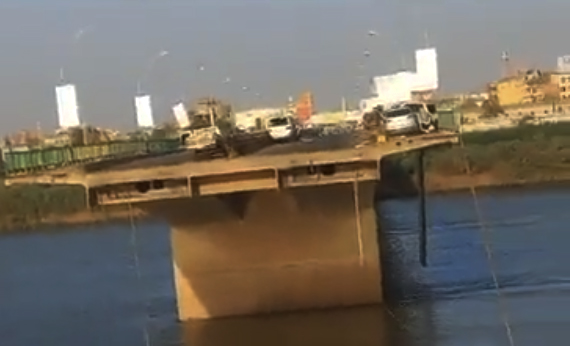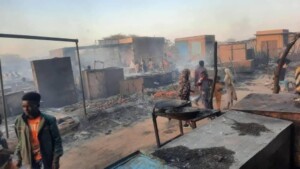Destruction of Sudan capital’s Shambat Bridge condemned as ‘war crime’

The Shambat bridge destroyed (Photo: Sudan War Monitor)
The destruction in the capital of Sudan on Saturday of the Shambat Bridge across the White Nile, which formed a strategic link between Omdurman and Khartoum North (Bahri), has been met with widespread condemnation, as the warring Sudan Armed Forces (SAF) and Rapid Support Forces (RSF) traded accusations.
In an interview with Radio Dabanga, military expert Lt Col (Retd) Omar Arbab said that the destruction of the Shambat Bridge is a quantum leap for military operations, and will lead to an increase in the intensity of battles.
“The destruction of the bridge will negatively affect RSF logistics, as it was the main supply artery in terms of resources and weapons,” Col Arbab says, “however that the RSF could use other supply routes through Jebel Aulia [in southeast Khartoum]”.
He predicts that battles will increase in ferocity as the RSF attempt to deal painful and effective blows, and said that the RSF will work to escalate attacks on El Fitihab Bridge [in southern Omdurman], and the base of the SAF Corps of Engineers. This will escalate operations in Omdurman, he says. “We cannot rule out attempts by the RSF to hit other bridges in retaliation for the destruction of Shambat Bridge.
‘War crime’
Yassir Arman, head of the Sudan People’s Liberation Movement-North–Democratic Revolutionary Movement (DRM) and spokesperson for the mainstream Forces for Freedom and Change Central Council (FFC-CC), says in a post on X (formerly Twitter) that the destruction of the Shambat Bridge is a war crime, and a troubling development in the destruction of vital facilities.
Omar El Digeir, head of the Sudanese Congress Party, said that the partial destruction of the Shambat bridge is “a criminal act legally and morally”.
For its part, the United Human Rights Centre said that the Shambat Bridge is considered one of the most important infrastructure elements in Khartoum state, pointing to a wave of incitement from activists on social media affiliated with the SAF camp, that preceded the destruction, of the need to demolish the bridge as it gives the RSF an advantage.
The centre said in a statement that the El Jili refinery, which was reportedly destroyed last week, which led to significant damage to its facilities, which is a major source of fuel and gas production in Sudan. The buildings of the Nile Petroleum Company, the Ministry of Justice building, other civilian objects, hospitals, mosques, and homes were also bombed, which are protected under international humanitarian law and are prohibited from being attacked.











 and then
and then